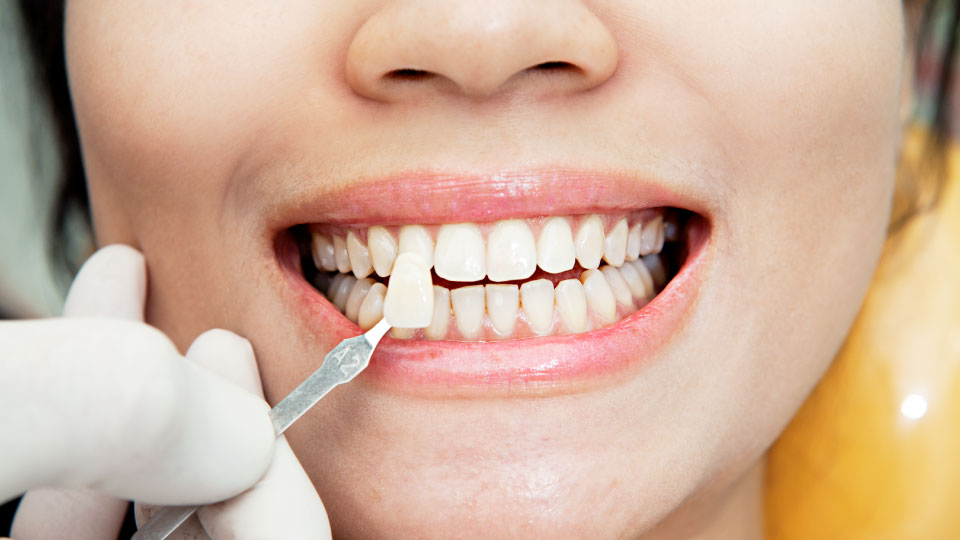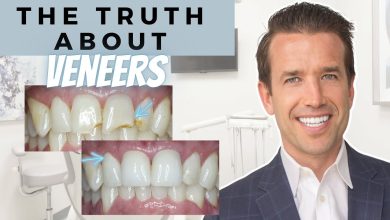How Long Do Dental Veneers Last?

Dental veneers typically last between 10 to 15 years with proper care and maintenance. Dental veneers are thin porcelain or composite shells that are bonded to the front surface of teeth to improve their appearance.
They are a popular cosmetic dentistry option for correcting various dental imperfections such as chips, stains, gaps, and misalignment. However, it’s important to note that the lifespan of veneers can vary depending on factors such as oral hygiene practices, bite force, and habits like teeth grinding or nail-biting.
Regular visits to the dentist for check-ups and cleanings can help prolong the lifespan of dental veneers. Additionally, avoiding excessive force on the veneers and practicing good oral hygiene can contribute to their longevity.
Factors Affecting The Longevity Of Dental Veneers
Factors Affecting the Longevity of Dental Veneers
The quality of veneer material plays a significant role in determining how long dental veneers will last. Porcelain veneers, known for their strength and durability, tend to have a longer lifespan compared to composite veneers.
Proper oral hygiene and care are essential in maintaining the longevity of dental veneers. Regular brushing and flossing, combined with regular dental check-ups and professional cleanings, can help prevent decay, gum disease, and other oral health issues that may affect the lifespan of veneers.
Various lifestyle habits can impact the durability of veneers. Avoiding nail-biting, chewing ice or hard objects, and using teeth as tools can help prevent chipping or cracking of the veneers. Additionally, habits such as smoking and frequent consumption of staining substances like coffee or red wine can stain or discolor the veneers over time.
Signs Of Veneer Wear And Tear
Discoloration of veneers can be a sign of wear and tear. Over time, veneers may start to lose their original color due to factors like staining from food and drinks or natural aging. Regular dental hygiene practices, such as brushing and flossing, can help prevent discoloration. However, if discoloration does occur, professional teeth whitening procedures can often restore the veneers’ original shade.
Chipping or cracking can also indicate that dental veneers are starting to deteriorate. This can happen due to trauma, teeth grinding, or chewing on hard objects. If you notice any chips or cracks on your veneers, it’s important to visit your dentist as soon as possible to assess the damage and explore potential treatment options.
Sensitivity and discomfort may be experienced if veneers are becoming worn out. As veneers age, the protective layer between the veneer and the natural tooth may wear down, causing increased sensitivity. If you start to feel sensitivity or discomfort in your veneers, it’s advisable to schedule an appointment with your dentist to determine the best course of action to address the issue.
Maintenance Tips For Prolonging Veneer Lifespan
Regular dental check-ups and cleanings are essential for maintaining the longevity of your dental veneers. These routine visits allow your dentist to assess the condition of your veneers and identify any potential issues before they become major problems. Additionally, professional cleanings help to remove any plaque or tartar buildup that could compromise the appearance and durability of your veneers.
Proper brushing and flossing techniques play a crucial role in extending the lifespan of your dental veneers. Using a soft-bristled toothbrush and gentle circular motions, brush your teeth at least twice a day to remove food particles and bacteria. Don’t forget to floss daily to clean between your teeth and along the gumline, ensuring that your veneers remain free of debris and plaque.
To protect the longevity of your veneers, it’s important to avoid certain habits that can damage them. Avoid biting or chewing on hard objects, such as pens or ice, as this can cause fractures or chips in your veneers. Additionally, refrain from grinding or clenching your teeth, as this can put excessive pressure on your veneers, leading to wear and tear. If you engage in activities such as contact sports, consider wearing a mouthguard to prevent accidental damage to your veneers.
Advantages Of Dental Veneers
Advantages of Dental Veneers:
Dental veneers have become a popular cosmetic dental solution due to their numerous advantages. One of the significant benefits of veneers is the improvement they offer in terms of appearance and confidence. Veneers can be customized to match the shape, size, and color of your natural teeth, giving you a flawless smile that boosts your self-esteem.
Another advantage is that dental veneers are resistant to staining and discoloration. Unlike natural teeth, veneers are made from materials that are less susceptible to discoloration caused by tea, coffee, or other food and drink. This means that your veneers will maintain their bright, white appearance for a much longer time.
Furthermore, dental veneers offer versatility in correcting various dental issues. Whether you have chipped, cracked, or misaligned teeth, veneers can effectively cover imperfections and provide a uniform and symmetrical smile. They can also help in closing gaps between teeth, giving you a more even and harmonious smile.
Drawbacks Of Dental Veneers
Drawbacks of Dental Veneers
The decision to get dental veneers is an irreversible procedure. Once the procedure is done, you cannot reverse it. It’s important to carefully weigh the pros and cons before making a final decision.
Another potential drawback of dental veneers is the risk of veneer damage. Although veneers are durable, they can still be damaged by excessive force, such as grinding or clenching of the teeth. It is important to avoid habits that may put undue pressure on the veneers to ensure their longevity.
Cost implications are also worth considering. Dental veneers can be quite expensive, and the cost may vary depending on the material and the complexity of the case. It is essential to discuss the cost with your dentist and consider your budget before proceeding with the procedure.
Dental Bonding
Dental bonding is a cosmetic procedure that involves the application of a tooth-colored resin material to the surface of the teeth. This procedure is often used to repair cracked or chipped teeth, close gaps between teeth, and improve the overall appearance of a person’s smile.
The process of dental bonding usually starts with the dentist roughening the surface of the tooth and applying a conditioning liquid. The resin material is then applied to the tooth and shaped to match the desired appearance. Once the resin is in place, a special light is used to harden and bond the material to the tooth.
There are several benefits to dental bonding, including its quick and relatively painless nature. It can usually be completed in one visit to the dentist, and anesthesia is typically not required. Additionally, dental bonding is one of the most cost-effective cosmetic dental procedures available.
Longevity And Considerations
The longevity of dental bonding can vary depending on a few factors. While dental bonding is not as strong or durable as other treatments like dental veneers, with proper care, it can last for several years. It is important to note that dental bonding material may be more prone to staining and chipping compared to other options.
To maintain the longevity of dental bonding, it is important to practice good oral hygiene, including regular brushing and flossing. It is also advisable to avoid biting or chewing on hard objects, such as ice or pens, as this can increase the risk of damage to the bonding material.
If you are considering dental bonding, it is best to consult with a qualified dentist who can assess your individual case and provide personalized recommendations. They can help determine if dental bonding is the right option for you and provide guidance on how to care for your bonded teeth to ensure their longevity.
Dental Crowns
When discussing dental restorations, dental crowns are often compared to veneers. While both options can improve the appearance of your smile, dental crowns offer different benefits and considerations.
| Procedure | Suitability |
|---|---|
| A dental crown involves reshaping the affected tooth and placing a customized cap over it. This process typically requires two visits to the dentist. | Dental crowns are suitable for individuals with severely damaged or decayed teeth that cannot be effectively treated with fillings or veneers. |
Compared to veneers, dental crowns provide enhanced strength and durability, as they fully encase the tooth. They can withstand the pressures of biting and chewing, making them an ideal option for molars or teeth with extensive damage.
However, it’s important to note that dental crowns require a more extensive tooth preparation, which involves removing a larger portion of the natural tooth structure. This irreversible process can weaken the tooth.
In conclusion, dental crowns offer a durable and reliable solution for major tooth damage. Your dentist will evaluate your specific needs to determine the most suitable option for your smile.
Orthodontic Treatments
Dental veneers are a popular solution for correcting various dental issues. However, there are alternative orthodontic treatments available that can help correct these issues without the need for veneers.
Correcting Dental Issues Without Veneers
Orthodontic treatments such as braces or clear aligners are effective in straightening crooked teeth, closing gaps, and correcting bite problems. These treatments gradually move teeth into their proper position, resulting in a more aligned and aesthetically pleasing smile. While the duration of orthodontic treatment can vary depending on the complexity of the case, most treatments typically last between 12 and 24 months.
Estimating Treatment Duration And Cost
The time required for orthodontic treatment depends on factors such as the severity of the dental issues, the chosen treatment method, and how well the patient follows the orthodontist’s recommendations. As for the cost, it can also vary depending on the treatment chosen and the location of the dental practice. It is recommended to consult with a qualified orthodontist to determine the duration and cost of the specific orthodontic treatment that best suits your needs.

Credit: drakefamilydds.com
Frequently Asked Questions Of How Long Do Dental Veneers Last?
Is There A Downside To Veneers?
Yes, there can be downsides to veneers. Some potential issues include tooth sensitivity, increased risk of damage or breakage, mismatched color with natural teeth, and the possibility of needing future repairs or replacements. It’s important to consult with a dentist to determine if veneers are the right option for you.
How Often Do Veneers Need To Be Replaced?
Veneers typically need to be replaced every 10 to 15 years.
What Happens To The Teeth Under Veneers?
Veneers are thin shells that cover the teeth. Underneath, the teeth remain intact.
Can You Get Cavities With Veneers?
Yes, you can still get cavities with veneers. While veneers protect the front surface of your teeth, the areas around the edges and between the teeth are still susceptible to decay. It’s crucial to maintain good oral hygiene and visit your dentist regularly for check-ups and cleanings to prevent cavities.
Conclusion
Dental veneers can provide a long-lasting solution for enhancing the appearance of your smile. With proper care and maintenance, they can last anywhere from 10 to 20 years. It is essential to adopt good oral hygiene practices and avoid habits that can cause damage to ensure the longevity of your veneers.
Regular dental check-ups and professional cleanings will also help in preserving their lifespan. So, if you’re considering getting dental veneers, rest assured knowing that you can enjoy their benefits for many years to come.




